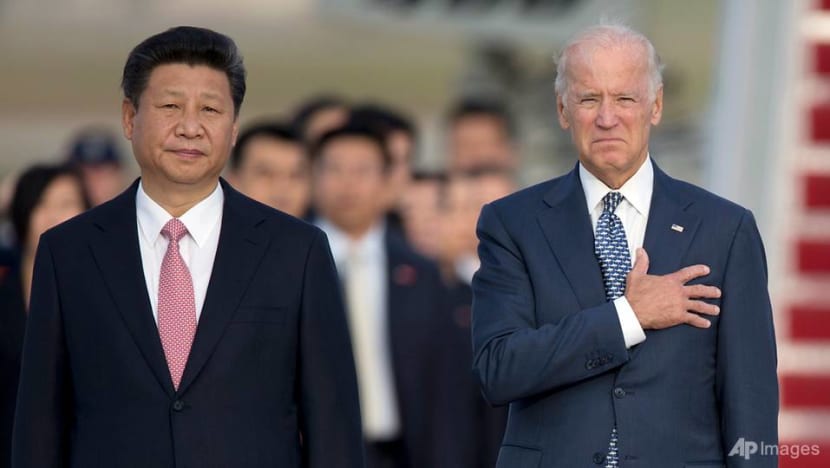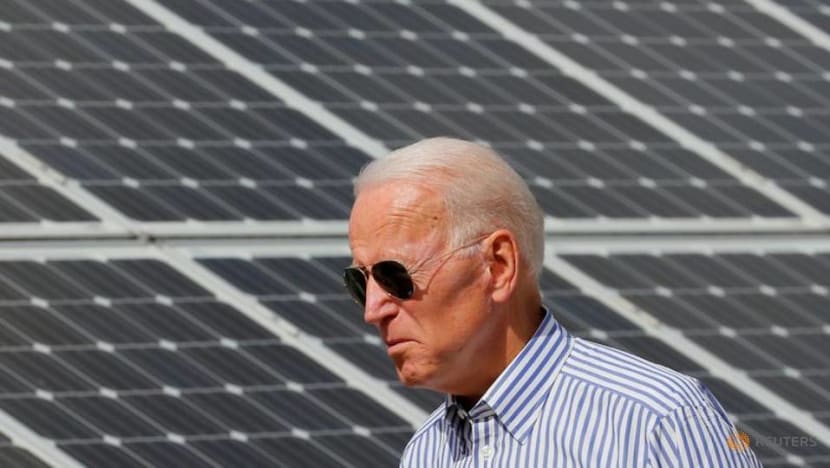commentary Commentary
Commentary: Cooperation between US, China at global climate summit could yield significant benefits
Securing mutual commitment of both superpowers will be needed to meet targets set in the Paris Agreement, says Yale-NUS College’s Yew Wei Lit.

In this Sep 24, 2015 file photo, Chinese President Xi Jinping, then Vice-President Joe Biden, stand for the US national anthem during an arrival ceremony in Andrews Air Force Base. (Photo: AP/Carolyn Kaster, File)
SINGAPORE: One of the most egregious legacies of the Donald Trump presidency has been an unapologetic onslaught on the environment.
Trump not only set up a bonfire of domestic environmental safeguards, he also notoriously pulled the United States out of the 2015 Paris Agreement on climate change.
The first 100 days of President Joe Biden’s administration has been mostly about course correction, salvaging whatever remains of the nation’s capacity and credibility for battling global warming.
READ: Commentary: Joe Biden takes office in pivotal moment for climate action. Can he deliver?
CHINA AND THE US NEEDED FOR MEANINGFUL HEADWAY ON CLIMATE ACTION
Mr Biden’s virtual global climate summit, held to coincide with Earth Day this week, will set the stage for the US to renew its vows with the climate agenda.
Dozens of world leaders have promised to attend, though the US should be pleased that China President Xi Jinping will be joining the party. After all, any climate talks would lack meaning without having representatives of the world’s biggest carbon emitter in the midst.
Together, China and the US account for nearly half of global greenhouse gas emissions. A cooperative arrangement between the two countries is hence necessary to meet the target set in the Paris accord: Limiting global warming to below 1.5 degrees Celsius.
READ: Commentary: Joe Biden’s quietly revolutionary first 100 days
To be sure, as the testy bilateral meetings in Alaska in March revealed, China-US relations remain extremely fraught.
Fundamental disagreements on what China perceives as its “internal” affairs, such as Hong Kong, Taiwan and Xinjiang, cannot be papered over. This, combined with bipartisan US scepticism towards China, may well derail any current goodwill toward a joint collaboration on climate.

Yet, according to a recent poll, a majority of US registered voters support greater government action in fighting climate change, three-fourths of whom wanted their country to rejoin the Paris agreement. Seizing the initiative in international climate action will likely be politically rewarding.
(Will a Biden presidency move the needle on climate action? Find out on The Climate Conversations.)
PROMISING SIGNS
So far, the signs are promising. The recent Shanghai talks between the special climate envoys of China and the US concluded with a joint statement on strengthening cooperation on climate issues. This is not insignificant.
A pathway may now open up for continuous bilateral dialogue to formulate concrete action, auguring well for the upcoming UN climate summit in November.
Indeed, both countries - and the rest of the world - are hoping for a repeat of the 2016 breakthrough in China-US talks that paved the way for the ratification of the Paris agreement.
Securing mutual commitment to the climate agenda avoids what partly doomed the 1992 Kyoto Protocol – the non-participation in different ways of these two major carbon polluters. In other words, it will be easier to pressure other countries to follow suit with their climate ambitions.
If it goes well, it may consolidate what the UN Secretary General Antonio Guterres envisioned last December of “a truly global coalition for carbon neutrality”. And since both China and the US have been hit hard by COVID-19, it becomes urgent to pool resources to stay the course of global decarbonisation.
READ: Commentary: US-China ties are set to worsen, before they get better
READ: Commentary: Expectations for reset in US-China relations must be managed
CHINA HAS THE UPPER HAND
Regrettably, when it comes to climate change initiatives over the last three decades, the US has followed a “one step forward, two steps backward” trajectory. By contrast, this time, China has entered the climate negotiations from a far stronger position.
The US withdrawal from the Paris Agreement had created a global climate leadership vacuum that China was keen to fill. Since then, China has been slowly but surely polishing its climate credentials.
The UN leadership has even recognised that Chinese investments, specifically the Belt and Road Initiative, will help foster sustainable development across developing countries throughout the global South.

Calling the Belt and Road “an important space” where green principles can be reflected in green action, Mr Guterres said in 2019 the initiative maps onto 17 Sustainable Development Goals and can translate into “real life progress for people”.
While the US has been a laggard in financing projects that help emerging economies to reach their climate goals, China has lived up to its reputation as the largest renewable energy investor worldwide. That 2020 was a difficult pandemic year did not stop China from spending about US$11 billion on renewable energy projects in its BRI partner countries – more than half of its total energy infrastructure investments.
Late last year, to the pleasant surprise of many observers, President Xi pledged that China's emissions will peak by 2030, and turn carbon neutral by 2060. To align with this national commitment, leading Chinese state-owned oil and gas companies have declared their own targets of carbon neutrality and begun diversifying their investments.
The same cannot be said of their US counterparts yet.
Tellingly, China now hardly uses the excuse of being a “developing country” to reject its climate responsibility.
READ: Commentary: China’s move on climate action signals arrival as a ‘hybrid superpower’
READ: Commentary: Is China’s ambitious carbon pledge just lip service?
MUCH MORE TO BE DONE
To be sure, a look at the Climate Action Tracker tells you how much still needs to be done by both nations. Though the US is performing worse, having been slapped with the rating “critically insufficient”, China’s progress remains “highly insufficient.”
This is due to its addiction to coal, the dirtiest fossil fuel. China currently burns more coal than all other countries combined for energy to grow its economy.
In fact, rather than downsizing its coal industry, China has been building more coal plants at home and abroad, contributing to three-quarters of the world’s new coal power capacity in 2020.
The US may still be able to catch up with China and most of the industrialised world. Sealing a cooperative pact with China on climate will be a crucial first step toward reclaiming a leadership role on climate action. The planet is better off with the US taking a more assertive position.

China-US relations can then be a mix of bilateral climate cooperation and constructive competition. The US could challenge China to a showdown of climate supremacy: Who reaches net-zero emissions first and who becomes the largest renewable energy solution provider.
This will certainly keep China on its toes, ensuring that it works hard toward matching its rhetoric with action.
Like the so-called Beijing and Washington Consensus that have shaped how states should run the economy today, US-China climate competition is as much a battle of ideas to influence the global order for generations to come.
Put simply, it is a matter of soft power. Each side will attempt to forge a new global consensus on climate governance by offering competing strategies for decarbonisation – will Washington’s market-led model prevail, or will it vindicate Beijing’s technocratic approach?
READ: Commentary: For China and the US, race to net-zero emissions doesn’t have to be cut-throat competition
READ: A look at China's environmental data ahead of climate change talks with US
Moreover, it impinges on their economic and technological competitiveness in a carbon-neutral future. Both countries will want to be in pole position to tap the rich market potential for green tech innovation in the developing world.
Unlike the zero-sum – and carbon intensive – nature of military competition that has intensified regional security concerns, such a climate tussle, if managed well, could offer humanity a greater sense of climate security, while helping support the next biggest carbon emitters transition into clean energy.
However, as President Xi noted, this is contingent on all parties remembering that climate change “should not become a geopolitical bargaining chip”.
This is unfortunately something even China has been equally guilty of when it restricted exports of rare earth minerals (a vital component for manufacturing clean energy technologies such as electric vehicles, solar panels and wind turbines) in response to a diplomatic spat with Japan in 2010.
Therefore, at the end of the day, climate competition must be tempered with robust partnership that facilitates knowledge transfers and exchange, research and development collaboration on climate solutions – and ultimately mutual understanding.
Dr Yew Wei Lit is a Postdoctoral Fellow in Social Sciences (Comparative Politics and Environmental Studies) at Yale-NUS College. The views and opinions expressed herein are those of the author and do not represent the views and opinions of Yale-NUS College or any of its subsidiaries or affiliates.














